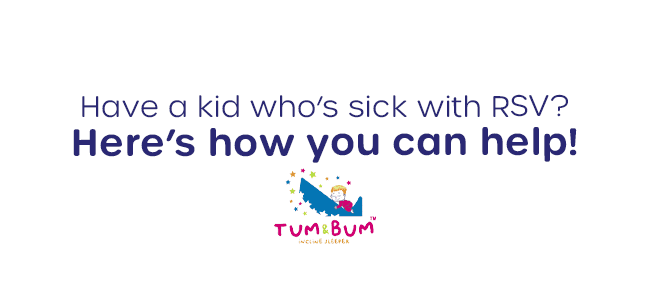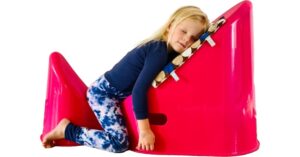admin
on
November 29, 2022

RSV has become quite a concern among parents lately, and for good reason. It’s taken much of the nation by storm, and has recently racked hundreds of thousands of infections, and it’s left many parents wondering what they’d do now that their toddler has RSV. Being a new and unfamiliar term to most families, RSV can be a scary prospect to both parents and kids alike — but there are steps you can take to mitigate its effects on your child.
Read on to learn more about what RSV is, and what you can do to help your child with RSV.
What is RSV?
RSV is an airborne virus that causes a prolonged, flu- or cold-like set of symptoms that may persist for up to two weeks. Depending on the age of your kid, the symptoms may be milder or bordering on uncomfortably heavy, in some cases even severe. Severe cases require immediate hospitalization, but milder RSV cases can appear to manifest as a lengthy cold with all of the accompanying symptoms. In milder cases, your doctor may recommend rest, ample fluid intake, and other measures to alleviate their sickness.
In such cases, there are a number of simple, albeit effective things you can do to help your sick kid beat their RSV and get back to their normal, healthy selves. If you have any questions about the immediate or long-term state of your child’s health, in regard to their RSV or not, consult your doctor.
Here’s a list of 4 tricks and strategies you can try with your child to aid their recovery against RSV:
Provide Over-the-Counter Medication
Fever is a common symptom of RSV, which can make your child upset, irritable, cause headaches, and/or give them chills or make them uncomfortable hot — often both. A fever can potentially further disturb your child’s health while they’re sick, which may unnecessarily hamper recovery. The CDC recommends the administering of over-the-counter pain medications as an RSV treatment for toddlers — acetaminophen and ibuprofen are two good options for pain and fever relief. Aspirin should never be given to children.
Give Your Child Enough Fluids
When they’re sick, your toddler may be at increased risk for becoming dehydrated. Dehydration is never good for anyone, young or old, but it can be especially bad for children who are also trying to kick their sickness to the curb. Making sure they’re getting enough fluids is a great way to ensure they recover properly and recover fast.
Good, old-fashioned water is always a safe bet when keeping your kid hydrated whilst they’re sick, but a fussy kid may not want to stick to a purely-water fluid regimen. Orange juice, Pedialite or other fruit juices may be a good supplement to their hydration, but the important thing is that they stay hydrated without ingesting anything that may get in the way of their recovery. Avoid drinks with caffeine, like soda, some teas, etc.
Make Their Recovery Comfortable
Rest is paramount in recovery from most common virus-borne sicknesses, and the most important thing for rest is comfort. Ensure that your child gets as much rest in as they reasonably can, and that their bed is well-made with clean sheets, complete with their favorite blanket or stuff animal, and that their room is at their preferred temperature.
For kids struggling to get comfortable because of congestion and coughing, placing them at a forward-facing incline while they rest can help naturally drain mucus and congestion. For good measure, add in plenty of other comforts to keep them at ease and entertained while they recover, like relaxing music, the occasional hour or two of TV or tablet time, etc.
Ensure Your Child Gets Enough Sleep
Resting while they’re awake is important, but plenty of sleep is what’ll really get them through their sickness. It’s a sick kid tip as old as time, but sleep really is the most important thing for a sick kid — or any sick person in general!
However, since RSV often causes nose-plugging and cough-inducing congestion and respiratory discomfort, sleeping can often be uncomfortable, even difficult. Their congestion may make them wheeze as they’re trying to get their sleep, or their coughing may be keeping them awake far long than they, and you, would like. The good news, is that there’s an easy solution to your kid’s bedtime congestion:
Use the Tum&Bum Incline Sleeper
 When your toddler is situated on its surface, the Tum&Bum lets them sleep at a forward-facing incline, which greatly helps in draining their airways naturally and effortlessly through gravity. With your kid’s airways clearer, they’ll enjoy reduced coughing and sniffling plus less noticeable wheezing, which will ultimately result in better, sounder sleep throughout the night and a shorter bout with RSV. The Tum&Bum is a sick kid’s best friend, and you can order your own now by clicking here.
When your toddler is situated on its surface, the Tum&Bum lets them sleep at a forward-facing incline, which greatly helps in draining their airways naturally and effortlessly through gravity. With your kid’s airways clearer, they’ll enjoy reduced coughing and sniffling plus less noticeable wheezing, which will ultimately result in better, sounder sleep throughout the night and a shorter bout with RSV. The Tum&Bum is a sick kid’s best friend, and you can order your own now by clicking here.
Take it from a mother, Katie M, who used the Tum&Bum to help her daughter:
“My daughter had RSV/pneumonia I had not slept in over a week because everytime I laid her down her oxygen dropped. The Tum&Bum changed my life.this product assured I could get some rest and my daughter could get some rest while improving her oxygen levels. This product is amazing ,and I will be telling everyone I know about it. It’s absolutely amazing!“
disclaimer: Dragovich Creations, LLC. does not claim to have medical or healthcare expertise. This material has been prepared for informational purposes only, and is not intended to provide, and should not be relied on for, health or medical advice, nor should it serve as a substitute for professional advice from your physician.
- Category: articles
